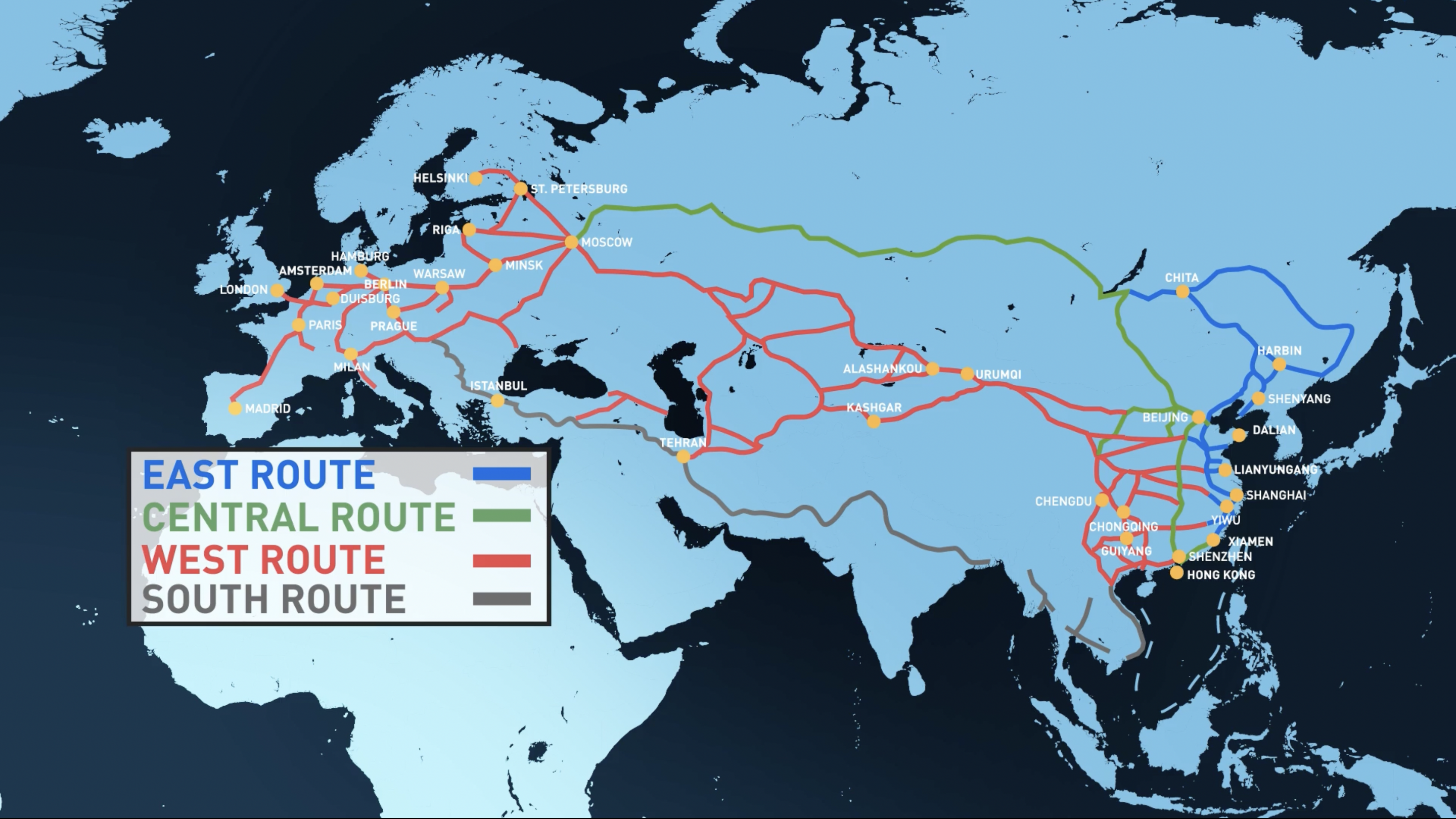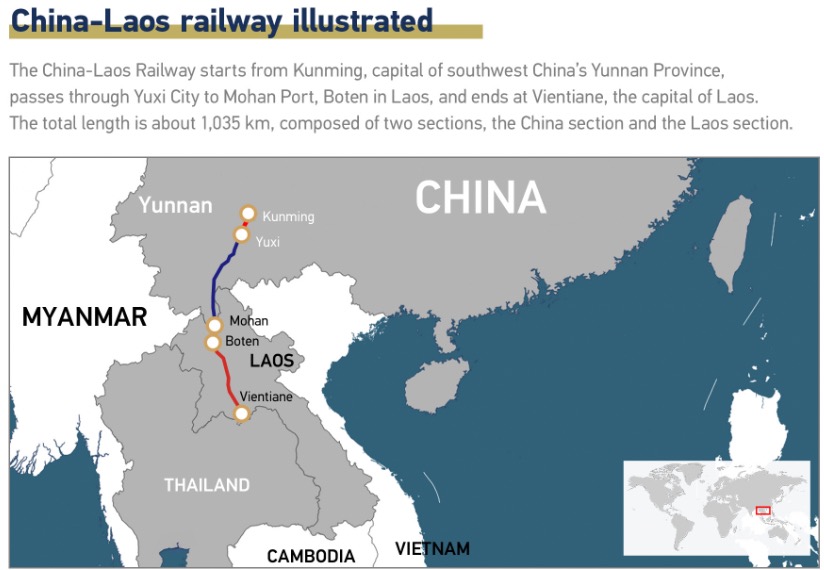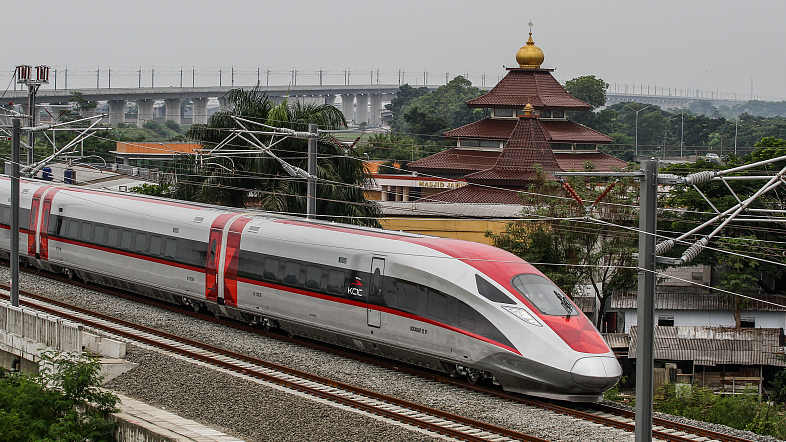Imagine a world connected by a massive network of railways that reaches to even the most remote cities of each country and provides opportunities for these poverty-stricken areas to pursue economical development.
Does that sound far-fetched? If your answer is yes, this article may surprise you.
The land connection via rail links is already taking place place, via the Belt and Road Initiative (BRI), in some parts of the world: Eurasia and Southeast Asia.
In Eurasia, by December 2022, the number of trains dispatched between China and Europe carrying everyday commercial goods had hit over 1,500. The China-Europe Rail Freight Link under the BRI has 82 different routes so far and connects 196 cities from 24 countries in Europe.

The map of the China-Europe Rail Freight Link /CGTN Photo
The map of the China-Europe Rail Freight Link /CGTN Photo
In Southeast Asia, the China-Laos Railway, for which China is responsible for most of the investment and construction, connects cities in China and Laos. It is the first railway in the previously landlocked Laos. Being landlocked was one main reason the country remains impoverished compared to coastal nations. Ever since the railway began operation in December 2021, the value of goods being transported by rail exceed 10 billion yuan ($1.43 billion) in nine months, according to statistics from Kunming Customs.

An illustration of the China-Laos railway. /CGTN Photo
An illustration of the China-Laos railway. /CGTN Photo
In November 2022, the Jakarta-Bandung high-speed railway, the first in Indonesia and Southeast Asia completed testing. It will begin operation in 2023. It also incorporates technology and equipment from China and dramatically reduces the travel time between the two cities in the country.
These are all infrastructure projects under the BRI, a long-term initiative proposed by China in 2013, which will help these regions connect with more economic hubs and aims to bring tangible benefits in the future.
Such projects are taking place and will continue to take place in West Asia, the African continent, Latin America and the Caribbean as more countries from these regions join the BRI.

A high-speed train on the Jakarta-Bandung HSR is tested in Bandung, West Java, Indonesia, November 11, 2022. /CFP
A high-speed train on the Jakarta-Bandung HSR is tested in Bandung, West Java, Indonesia, November 11, 2022. /CFP
"It's very encouraging to see that these remote, marginalized areas with smaller cities will be connected, driven by logistic development," said Professor Chen Xiangming, director of the Urban Studies Program at Trinity College, Hartford Connecticut, in a recent webinar called Outcome and Implications of the 20th National Congress of the Communist Party of China (CPC) organized by Belt & Road Institute in Sweden (BRIX).
Diplomats and scholars from different countries attended the webinar and shared their analysis on the BRI. Participants included China's ambassador to Sweden, Cui Aimin, Belarus' ambassador to Sweden, Dmitry Mironchik, former undersecretary of state at the Italian Ministry of Economic Development, Michele Geraci, professor of politics and society at Aalborg University Denmark, Li Xing, professor at the University of South-Eastern Norway, Glenn Diesen, and chairman of the Schiller Institute in Sweden, Ulf Sandmark.
In his speech, Professor Chen analyzed the stops of each rail link and said that connecting these left-behind regions would give them chances to catch up. He added that this potential had not been understood and studied enough by the West.
Attendees of the webinar expressed similar concerns: the real potential of economic development under BRI, which the whole world can benefit from, is not being explained enough, and sometimes even demonized, especially in some Western countries.
In a report to the 20th CPC National Congress, which concluded in October, Chinese President Xi Jinping said, "No matter what stage of development it reaches, China will never seek hegemony or engage in expansionism."
"China is prepared to invest more resources in global development cooperation, especially in narrowing the North-South gap and supporting and assisting other developing countries in accelerating development," Xi added.
Belarus' Ambassador to Sweden Dmitry Mironchik said China had been consistent in its words, and the message came out from China's 20th CPC National Congress would further enhance the BRI.
"The existence and open character of China's development plans discussed and endorsed at the Congress helps shape our own diplomacy and economic development goals," Ambassador Mironchik said. "This is an asset for everybody to use, regardless of their intention and desires to participate."